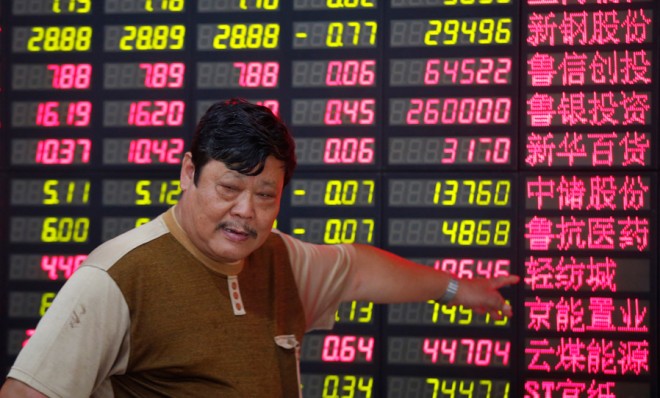How emerging economies lost their mojo
3 reasons the world's economic engines are sputtering

Emerging markets, once the world's economic overachievers, are having a tough time lately.
With the U.S. and Europe continuing to limp along in the post-crisis era, emerging markets were supposed to provide the horsepower that kept the global economy going forward. But there are signs that the days of double-digit growth are over for developing economies — which could have huge implications for the rest of the world.
The economist Nouriel Roubini, also known as Dr. Doom, has been characteristically pessimistic, writing that the BRICS economies — Brazil, Russia, India, China, and South Africa — are running out of steam.
The Week
Escape your echo chamber. Get the facts behind the news, plus analysis from multiple perspectives.

Sign up for The Week's Free Newsletters
From our morning news briefing to a weekly Good News Newsletter, get the best of The Week delivered directly to your inbox.
From our morning news briefing to a weekly Good News Newsletter, get the best of The Week delivered directly to your inbox.
"Many of the BRICS, along with some other emerging economies, may hit a thick wall, with growth and financial markets taking a serious beating," he writes at Project Syndicate.
Why the lag? A few factors:
The U.S. and Europe
The sluggish recovery in the U.S., coupled with the prolonged recession in Europe, appear to be weighing down on emerging markets. That would shatter a faddish theory of recent years known as decoupling, which holds that emerging economies have become so strong that they are no longer as vulnerable to the ups and downs of industrialized powers.
A free daily email with the biggest news stories of the day – and the best features from TheWeek.com
"[T]he idea that emerging-market economies could fully decouple from economic weakness in advanced economies was far-fetched; recession in the euro zone, near-recession in the United Kingdom and Japan in 2011-2012, and slow economic growth in the United States were always likely to affect emerging-market performance negatively — via trade, financial links, and investor confidence," writes Roubini.
Emergency monetary policies
The enormous bond-buying stimulus programs of the Federal Reserve and European Central Banks not only pulled interest rates down in the West, but also pushed money into developing markets. The great flow of so-called hot money to the developing world in some respects had a positive effect, but it was also highly volatile — which emerging markets found out once Fed Chairman Ben Bernanke began suggesting that the central bank could begin winding down its emergency monetary policies.
Here's the Japan Times:
The money started to flow out of these economies after U.S. Federal Reserve Chairman Ben Bernanke hinted in late May at scaling down U.S. quantitative easing. Dissatisfaction in emerging economies is mounting over slower growth and imported inflation caused by cheap currencies. The communique said, "We reiterate that excess volatility of financial flows and disorderly movements in exchange rates have adverse implications for economic and financial stability." [Japan Times]
Big troubles in big China
Though a 7.5 percent growth rate is still nothing to sneeze at, many economists have long warned that China could be setting the stage for a crisis. "China could even be headed towards a hard landing," says The Wall Street Journal — tough news for other emerging economies dependent on Chinese trade and consumption.
Russia's growth, for example, is closely tied to China's demand for energy, which boosted prices and provided a new market for Russia's oil and gas markets. And Brazil has close trade ties with China, too, exporting a wide array of products from soy beans to iron ore.
But China's slowdown isn't all doom and gloom. The Economist:
China is in the midst of a precarious shift from investment-led growth to a more balanced, consumption-based model. Its investment surge has prompted plenty of bad debt. But the central government has the fiscal strength both to absorb losses and to stimulate the economy if necessary. That is a luxury few emerging economies have ever had. It makes disaster much less likely. [The Economist]
The bottom line, says The Economist: "Over the next ten years emerging economies will still rise, but more gradually. The immediate effect of this deceleration should be manageable. But the longer-term impact on the world economy will be profound."
Carmel Lobello is the business editor at TheWeek.com. Previously, she was an editor at DeathandTaxesMag.com.
-
 5 chilling cartoons about increasing ICE aggression
5 chilling cartoons about increasing ICE aggressionCartoons Artists take on respect for the law, the Fourth Amendment, and more
-
 Political cartoons for January 24
Political cartoons for January 24Cartoons Saturday's political cartoons include 3D chess, political distractions, and more
-
 Ryanair/SpaceX: could Musk really buy the airline?
Ryanair/SpaceX: could Musk really buy the airline?Talking Point Irish budget carrier has become embroiled in unlikely feud with the world’s wealthiest man